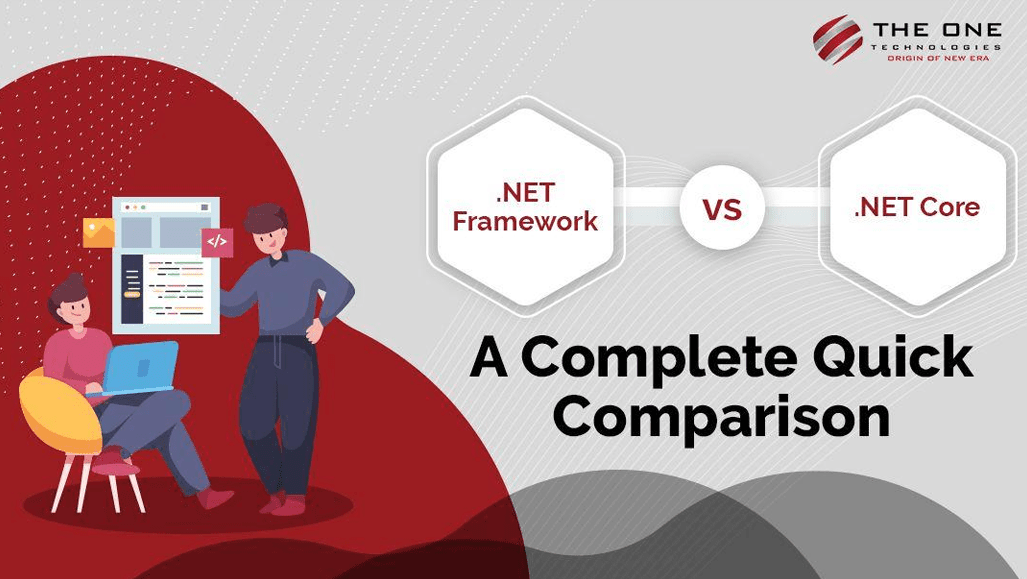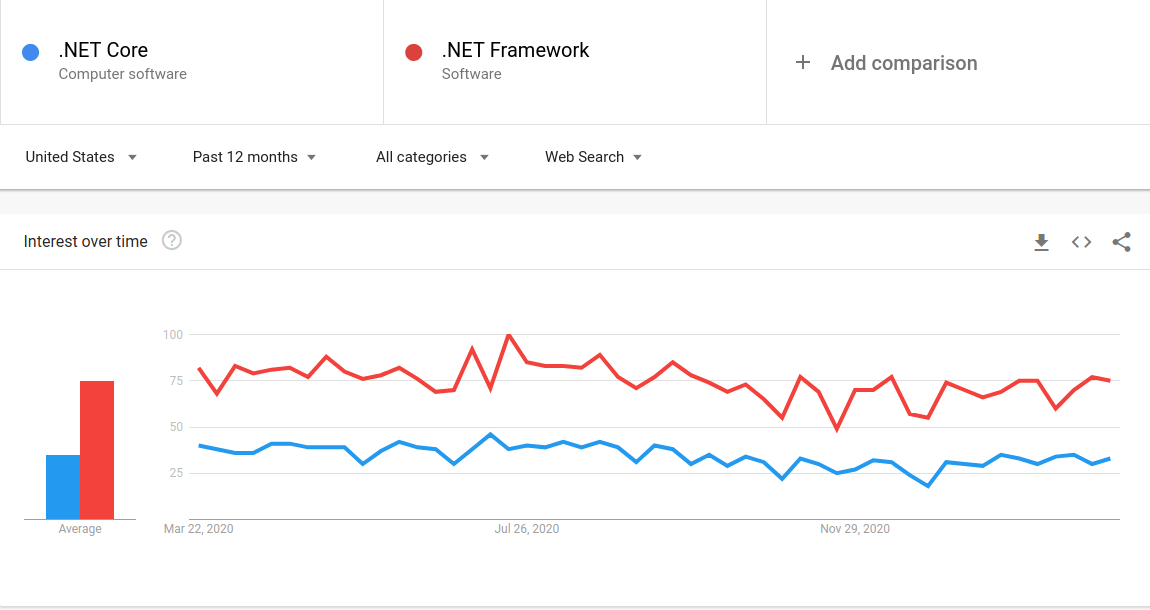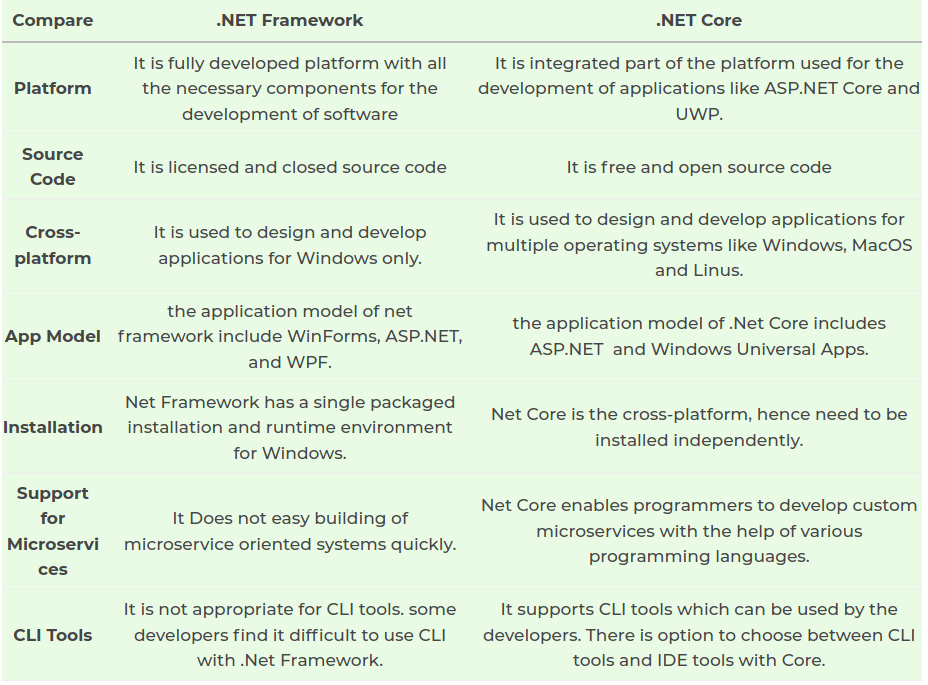.NET Framework Vs .NET Core: A Complete Quick Comparison

In recent years, .NET technology has made its mark among many developers. There is an increasing demand for skilled .NET developers in this technology. Obviously, .NET technology refers to both .NET Framework and .NET Core. With the increasing demand for asp net development services, companies are offering quality web development projects. Therefore, it’s the right time to invest in these two languages after having sufficient knowledge.
As we know, both .NET Framework and .NET Core have made their impression in the web development services. However, the debate is still on which is better in the long run. But you know what, this is a never-ending debate and will not lead you to a conclusion. But on the other hand, we know that .NET Core is coming up with new features and functionalities to simplify the development and testing of desktop, web, cloud, and mobile applications.
Let’s know what the trend has to say:

As per Google Trends, .NET Core development services is leading on the internet.
So now you must have a question: how is .NET Core different from .NET Framework? What would be the basic difference between them? Do we need to migrate from .NET Framework to .NET Core?
Well, to answer the above questions, we are coming up with a basic comparison. It will make it easy for you to choose one for web app development.
Let’s start with the basics.
What’s .NET?
Developed by Microsoft, .NET is a free and open-source software development platform. It allows developers to develop server-side applications. Using various tools and libraries, developers can develop applications and services much faster in a convenient way.
With .NET, you can make use of various languages such as C#, F#, or Visual Basic, libraries, and editors to develop web, gaming, mobile, IoT, and desktop applications.
To build server-side applications, we can find two frameworks under the umbrella of .NET technologies - .NET Framework and .NET Core.
.NET Framework is the initiation of innovation. Whereas, .NET Core is the modern and advanced version of the .NET family.
An Overview: .NET Framework and .NET Core
Both .NET Framework and .NET Core have similar components and allow developers to share code. But still, it creates confusion for some people while choosing the right technology.
What’s .NET Framework?
Microsoft began developing .NET Framework in the late 1990s for the need for Next Generation Windows Services.
By the early 2000s, the first beta version of .NET 1.0 was released. As a result of the release of the .NET Framework, many frameworks were launched and updated in many advanced features.
.NET Framework has mainly two components called the Common Language Runtime (CLR) and an extensive class library.
Two Main Components:
Common Language Runtime (CLR): It offers a platform for running mobile apps and provides memory management.
Extensive Class Library: It’s a set of trails and tested reusable codes for all development stages that any developer can use.
The main objective of developing .NET was to create an easy-to-use object-oriented environment, which could be leveraged by multiple languages. But, being closed source, users migrated to open-source platforms. Thus, to survive in the competition, Microsoft came up with the .NET Core as an open-source platform.
What’s .NET Core?
.NET Core is an open-source and cross-platform framework. It’s used to build applications for Windows, macOS, and Linux operating systems. For .NET Core, developers can use C#, F#, and Visual Basics to write applications and libraries.
The first major version of .NET Core was focused on developing high-performance web and microservices. And, to create version 2.0 more rich, multiple APIs and components were integrated to ease the migration of web applications to .NET Core.
Moreover, .NET 5 also helps you develop desktop, web, cloud, mobile, gaming, IoT, and AI applications. The latest .NET version aims to produce a single .NET runtime and framework, cross-platform, integrating the best features of .NET Core, .NET Framework, Xamarin, and Mono.
Both .NET Core and .NET Framework allow developers to develop applications hassle-free. Here, as an ASP NET development company, we have come up with the difference between .NET Framework and .NET Core.
The Core Difference: .NET Framework Vs .NET Core
The option you choose - .NET Application Development and .NET Core Development completely depends upon your requirements, budget, type of application, and platform on which it is to be launched.
However, we have to consider a few factors for the next project.
Cross-Platform Compatibility and Open Source
.NET Framework
.NET Framework is used to build Windows Desktop applications and server-based software on a single platform. The language compilers ensure that programs written in one language can be assessed and compiled in other languages as well.
.NET Framework was launched as a licensed and proprietary software framework. Hence, some components of the .NET Framework are open-source. You can get a licensed copy after paying fees.
.NET Core
.NET Core is cross-platform. It’s compatible with various operating systems like Windows, Linux, and macOS. Moreover, it also supports more computer languages, which makes it easy to develop cross-platform apps. Also, developers can easily migrate the existing apps to another platform.
Since .NET Core is open-source, both individual and enterprise developers can build apps without paying any licensing fees.
Deployment Model
.NET Framework
.NET Framework allows developers to deploy web applications only via the Internet Information Server.
However, it has the option of Xcopy deployment, which copies files to the intended directories. Small applications work well with Xcopy, but migrating complex apps requires more steps and are tedious.
.NET Core
.NET Core offers a flexible and accessible deployment model. With the latest release of .NET Core, it gets deployed instantly and automatically without affecting the existing files. It gets uploaded in the new directories one at a time and in one machine.
Moreover, you can directly deploy the applications in the cloud. Also, by creating your own hosting process, you can even self-host the applications.
Performance and Scalability
.NET Framework
.NET Framework is not as fast as we think. It doesn’t have a nature of flexibility and security. During the deployment of the application, the .NET Framework compiles the CIL code into executable code using its just-in-time compiler. It caches the executable program into the .NET Native Image Cache to speed up the first launch.
.NET Core
.NET Core is more effective than .NET Framework. It enables developers to boost the app performance significantly without using any additional hardware.
Automatically, .NET Core optimizes the compiled code without any changes. This recompilation feature increases performance.
Using the cloud, developers can directly develop, test, and deploy applications.
Thus, .NET Core enables developers to develop faster and scalable applications without having any trouble.
Library Collection
.NET Framework
.NET Framework developers can utilize the robust class libraries. These libraries implement many common functions, such as file reading and writing, database interaction, XML document manipulation, and graphics rendering.
.NET Core
.NET Core can leverage the robust class libraries, but it even uses a redesigned common language runtime called CoreCLR. Here, developers can pick and use any libraries as per their choices. Also, they can remove unnecessary libraries.
Quick Comparison: .NET Framework Vs .NET Core

.NET Framework is a better choice when:
- Requires less time to learn new technology.
- You have to improve the functionality written in the existing .NET Framework.
- You can leverage technologies that are not available in .NET Core.
- Nearer release schedules.
- Requires a mature and stable environment for work.
- Helps you create Windows client desktop apps using Windows Forms or WPF.
- Doesn’t have to upgrade and do changes on a daily basis.
.NET Framework Advantages:
If you are a .NET developer who is looking to build and release .NET technologies in a very short time, then .NET Framework is the best choice.
On the other hand, .NET Core is difficult to learn. It needs time to get used to it. However, if you wish to upgrade your apps in the .NET technologies quickly, the .NET Framework with .NET Core porting of the app is the suitable choice.
.NET Core is a better choice when:
- If you are planning to develop cross-platform applications.
- Helps you develop high-performance and scalable apps.
- You need to containerize your solution.
- Requires to install apps with dependencies on various .NET versions.
- Requires side-by-side .NET versions per application.
- If you want to develop a microservices-based system.
.NET Core Advantages:
- If you have two options to select for developing software, then .NET Core is the right option.
- .NET Core allows you to develop cross-platform apps, supporting Windows, Linux, and macOS.
- .NET Core helps the developers to bring modern interfaces to Windows Forms and WPF.
- It also supports the microservices along with Java and Ruby. This makes the platform extremely useful for developers.
What Is Right For Your Project?
.NET Core development services are the preferred technology to develop robust and scalable server-side applications. .NET Core is making development much easier and more profitable.
Existing applications are always safe and secure to remain on the .NET Framework.
However, existing applications can leverage the new features and functionalities by migrating to .NET Core. And if the components are supported on .NET Core, it’s advisable to stick to the .NET Framework.
So, now, let me ask you a question. Are you still not clear about choosing the right runtime for your software?
Well, we can help you with that as well.
As a renowned ASP.NET Core development company, we are offering seamless services to SEMs, enterprises, and Fortune 100 companies.
Are you looking for a NET Development company? Let us know your requirements and our experts will help you.
If you find this blog useful and are curious to know more about asp.net web development, please go through the below-mentioned blogs.
- Integration of Bing search API in ASP.NET
- ASP.NET - how to request read receipt in email
- DataView RowFilter & DataTable.Select DateTime conditions in .Net








